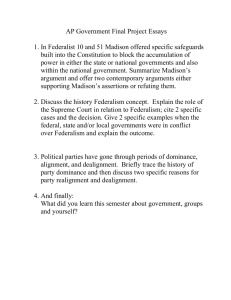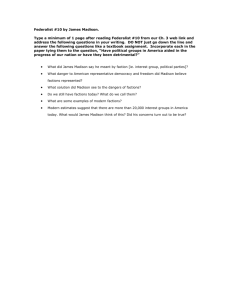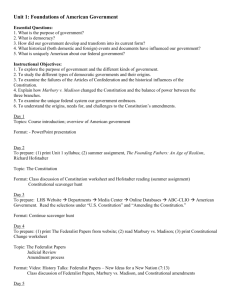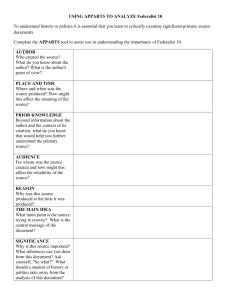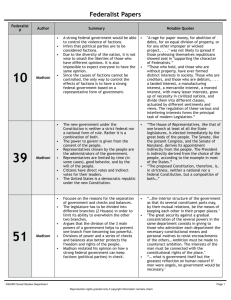Madison's View of Federalism in "The Federalist" Francis R. Greene
advertisement
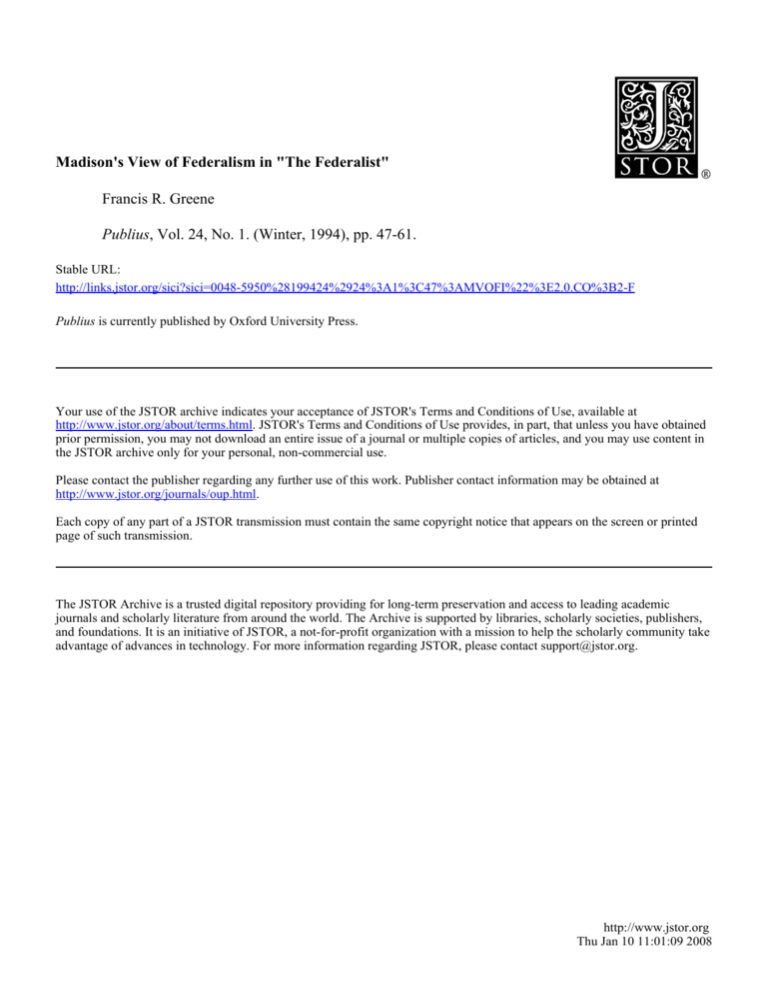
Madison's View of Federalism in "The Federalist" Francis R. Greene Publius, Vol. 24, No. 1. (Winter, 1994), pp. 47-61. Stable URL: http://links.jstor.org/sici?sici=0048-5950%28199424%2924%3A1%3C47%3AMVOFI%22%3E2.0.CO%3B2-F Publius is currently published by Oxford University Press. Your use of the JSTOR archive indicates your acceptance of JSTOR's Terms and Conditions of Use, available at http://www.jstor.org/about/terms.html. JSTOR's Terms and Conditions of Use provides, in part, that unless you have obtained prior permission, you may not download an entire issue of a journal or multiple copies of articles, and you may use content in the JSTOR archive only for your personal, non-commercial use. Please contact the publisher regarding any further use of this work. Publisher contact information may be obtained at http://www.jstor.org/journals/oup.html. Each copy of any part of a JSTOR transmission must contain the same copyright notice that appears on the screen or printed page of such transmission. The JSTOR Archive is a trusted digital repository providing for long-term preservation and access to leading academic journals and scholarly literature from around the world. The Archive is supported by libraries, scholarly societies, publishers, and foundations. It is an initiative of JSTOR, a not-for-profit organization with a mission to help the scholarly community take advantage of advances in technology. For more information regarding JSTOR, please contact support@jstor.org. http://www.jstor.org Thu Jan 10 11:01:09 2008 Madison's View of Federalism in The Federalist Francis R. Greene Lake Forest, Illinois Interpreters of James Madison's treatment of federalism in The Federalist are divided into two general camps: those who consider him to have defended federalism with cogency and conviction and those who consider his defense, on account of his concealed antipathy tofederalism, to be half-hearted. Although Madison had reservations about the Constitution's new structure, three charges of disingenuousness that have been leveled against him are mistaken. The evidence mainly suggests that he viewed the Constitution as establishing a divided system ofgovernment, that he was not particularly confident that future state-federal conflicts would be resolved peacefully, and that, despite his reservations about the new system, he wanted to see it in operation before thinking about how it might be reformed. Over the last generation or so, scholars have debated James Madison's treatment of federalism in The Federalist. Some have read his essays as confirming the work's sobriquet as the "bible of American federalism";' others have read them in light of Thomas Jefferson's comment that "in some parts it is discoverable that the author means only to say what may be best said in defence of opinions in which he ~ to this latter view, Madison's rhetoric was that of a did not c o n c ~ r . "According radical centralizer seeking either to mask his antipathy to federal government or downplay the degree to which the new government deviated from confederal principle^.^ 'Carl J. Friedrich, Trends of Federalism in Theory and Practice (New York: Praeger, 1968), p. 18; Samuel H. Beer, "Federalism, Nationalism and Democracy in America," American Political Science Review 72 (March 1978): 9-21; Samuel H. Beer, To Make A Nation: The Rediscovery ofFederalism (Cambridge, Mass.: Harvard University Press, 1993); Gottfried Dietze, The Federalist: A Classic on Federalism and Free Government (Baltimore, Md.: Johns Hopkins University Press, 1960); Heinz Eulau, "Polarity in Representational Federalism: A Neglected Theme of Political Theory," The Federal Polity, ed. Daniel J. Elazar (New Brunswick, N.J.: Transaction, 1974), pp. 153-171. 2Jeffersonto Madison, 18November 1788,The Papers ofJames Madison, ed. William T . Hutchinson and William M. E. Rachal (Chicago, Ill.: University of Chicago Press, 1987), 11:353. 'Irving Brant, James Madison (Indianapolis, Ind.: Bobbs-Menill, 1941- 1961), 3: 181-182; George Carey, The Federalist: Design for a Constitutional Republic (Urbana: University of Illinois Press, 1989), p. 97; Martin Diamond, "The Federalist's View of Federalism," Essays in Federalism, ed. George C. S. Benson (Claremont, Cal.: Institute for Studies in Federalism, 1961), pp. 48-62; David F. Epstein, The Political Theory of The Federalist (Chicago: University of Chicago Press, 1984), pp. 5 1Publius: The Journal of Federalism 24 (Winter 1994) 47 This debate has remained fairly polarized, the two sides often talking past each other.4 There is reason to think, however, that neither side has gotten Madison's position exactly right. On the one hand, it is difficult to accept the contention that his "numbers of The Federalist did not defend a system that he privately regarded as severely flawed."' Shortly after the Constitutional Convention, he expressed grave concerns about the states' residual autonomy, and there is little evidence to suggest that he changed his mind in the ensuing few months. On the other hand, equally implausible is a view ofMadison as, in essence, Alexander Hamilton's alter ego. Such a view has contributed to exaggerations of Madison's disingenuousness in The Federalist. Although Madison was certainly capable of calculated silence and ambiguity, there are three instances in which Madison's rhetoric has been falsely alleged to obscure more deeply considered views: that especially in Number 39, his talk of residual state sovereignty concealed a conviction that the Constitution was a plan for a unitary state; that, especially in Numbers 45 and 46, his concern about the states' centrifugal tendencies was gratuitous because he expected those "dangerous centrifugal tendencies to diminish in the future"; and that, in general, while writing all of his Federalist essays, he hoped the new government would succeed in obtaining even more power for the purpose of keeping the states in check.6 While plausible-as well as possessing distinguished adherents-these claims are mistaken. Madison in fact saw the Constitution as a plan for a supreme but limited government. In addition, he was far less certain than Hamilton about how the new government would fare in practice. Various scenarios were possible, none of which can be said to have been "expected." Like his New York colleague, of course, he had deep theoretical reservations about the Constitution; unlike him, he appears to have been willing to reserve ultimate judgment about its merits until after it had actually been tested. Before then, no useful purpose was served by serious contemplation of constitutional reform. 58, 98, 102; Charles F. Hobson, "The Negative on State Laws: James Madison, the Constitution, and the Crisis of Republican Government," Williarri and Mary Quarterl,~36 (April 1979): 233-235; Patrick Riley, "Martin Diamond's View of The Federalist," Publius: The Jour.rro1 of Federalism 8 (Summer 1978): 71-101; Garry Wills, E.~ploinirlgArrlerica: The Federalist (Garden City, N.Y.: Doubleday, 1981), pp. 162-175; Jean Yarbrough, "Madison and Modem Federalisn~," How Federal Is the Constiturior~?,eds. Robert A. Goldwin and William A. Schambra (Washington, D.C.: American Enterprise Institute, 1987), pp. 86-91. 4An exception is found in Publius: The Journal of Federalism 15 (Winter 1985): See Vincent Ostrom, "The Meaning of Federalism in The Federalist: A Critical Examination of the Diamond Theses," 1-21; Vincent Ostrom, "Historical Circumstances and Theoretical Structures as Sources of Meaning: A Response," 55-64; Paul Peterson, "Federalism at the American Founding: In Defense of the Diamond Theses," 23-30; and Jean Yarbrough, "Rethinking 'The Federalist's View ofFederalism'," 31-53. 'Lance Banning, "The Practicable Sphere of a Republic: James Madison, the Constitutional Convention, and the Emergence of Revolutionary Federalism," Beyond Confederation: Origins of the Constitution and American National Identity, eds. Richard Beeman, Stephen Botein, and Edward C. Carter I1 (Chapel Hill: University of North Carolina Press, 1987), p. 164. Varbrough, "Madison and Modem Federalism," p. 87; see also Diamond, "The Federalist's View of Federalism," pp. 50-51; Carey, The Federalist, pp. 117-1 18. Madison's View of Federalism in The Federalist 49 FEDERALIST 39 Although Madison refers to the states' sovereign powers in other essays, it is in Number 39 that he most systematically sets forth his view (as opposed to evaluation) of the new system's structure. The essay was designed to answer the AntiFederalist criticism that the Constitution was a plan for consolidated government, an innovation that exceeded the bounds of the Convention's commission and threatened America's republican institutions. The constellation ofpowers granted the federal government was one indication of the plan's consolidationist character;' another was the Constitution's failure to pass what might be called the "identity" test: For whom or what is power exercised? Over whom or what? There are but two modes by which men are connected in society, the one which operates on individuals, this always has been, and ought still to be called, national government; the other which binds States and governments together. . . this last has heretofore been denominated a league or confeder~cy.~ Because various aspects of the Constitution largely applied to individuals rather than states, it was regarded as a consolidation. In response, Madison examined five different aspects of the proposed government, concluding that it was neither exclusively federal nor exclusively national but "a composition of both."9 Insofar as it "operated" on individuals rather than on states, it was more or less exclusively national. Otherwise, it was-as in the ratification process--either wholly federal or-as in the electoral and amendment processes, respectively-neither "wholly nationalnor whollyfederal."1° Ratification was federal because, though the Constitution would receive popular rather than legislative ratification, it was state citizenries rather than one single national citizenry which would decide." By the same reasoning, elections were of a mixed character because individuals and states were both represented in the Congress and involved in the selection ofthe president.'* Because amending the Constitution was by states, it was federal, but because unanimity was not required, "it loses again the federal, and partakes of the national ~haracter."'~ Madison's discussion of the extent of federal power has elicited the most controversy. Consolidations, he argued, concentrate in a single national legislature an "indefinite supremacy over all persons and things, so far as they are objects of lawful government," a supremacy giving complete superiority over "all local authorities," which "may be controlled, directed, or abolished by it at pleasure." In "communities united for particular purposes," in contrast, supremacy is "vested partly in the general and partly in the municipal legislatures." These "local or 'See, for example, Brutus, "Essays," The Complete Anti-Federalist, ed. Herbert J . Storing (Chicago: University of Chicago Press, 1981), 2:367. 'Farmer, "Essays," The Complete Anti-Federalist, 5:29. 9Jacob E. Cooke, ed., The Federalist (Middletown, Conn.: Wesleyan University Press, 1961), p. 257. I0Ibid. "Ibid., pp. 253-254. "Ibid., pp. 254-255. "Ibid., p. 257. municipal authorities form distinct and independent portions of the supremacy, no more subject, within their respective spheres, to the general authority, than the general authority is subject to them, within its own sphere." Because its authority "extends to certain enumerated objects only, and leaves to the several States a residuary and inviolable sovereignty over all other objects," the new government was federal.I4 One of the few passages in Number 39 that John C. Calhoun did not find "contradictious,"15 the analysis has elicited the opposite reaction from Gany Wills. This and other references to state sovereignty, he has argued, were mainly designed to assuage Anti-Federalist fears. Although the states were "potential" sovereignsa status they would re-assume if ever required to ratify another constitution in the hture-they were no more than this.16 The Constitution was a plan for unitary government, the creation of a sovereign people delegating its necessarily indivisible authority to the federal government e x c l ~ s i v e l y . ~ ~ Wills points to the U.S. Supreme Court, which has the last word in state-federal conflicts, as well as to all the passages where Madison (and Hamilton) indicate that sovereignty is and ought to be indivi~ible.'~The "greatest proof," however, is Madison's effort to get the Constitutional Convention to accept a federal veto on state legislation. Although thwarted, these efforts conclusively show that he had no intention of creating anything but a unitary state. "In the Convention, as well as in his pre-Convention writings, Madison persistently located the weakness of the Confederation in the sovereignty of the states. He can hardly have written The Federalist to maintain that condition."19 That Madison sought the veto, however, does not prove that he regarded the Constitution as unitary; after all, just because he wanted a unitary system does not mean he got one. If he did believe he had obtained a unitary system, why after the Convention does he say that the "system involves the evil ofimperia in imperio"?*O Wills is curiously silent, moreover, about the passage in which Madison appears to endorse the Federalists' famous innovation in sovereignty theory, the passage where, in the words of Jack Greene, it is claimed that "the basic powers of sovereignty could be divided without dividing sovereignty itself."2' Said Madison: The Foederal and State Governments are in fact but different agents and trustees o f the ?bid., p. 256. I5John C. Calhoun, A Disquisition or1 Goverr~mentand A Discourse on the Constitutiorl and Governmer~tof the United States, ed. Richard K. CrallC (New York: Russell & Russell, 1968), pp. 150152; see also Raoul Berger, Federalism: The Founders' Design (Norman: University of Oklahoma Press, 1987), pp. 63, 152. 16Wills,Explaining America: The Federalist, pp. 157-161. I7Ibid.,pp. 160-175. I8Forexample, in Cooke, The Federalist, pp. 93, 128-129, 284-285, 306. I9Wills,Explaining America: The Federalist, p. 167. 'OMadison to Jefferson, 24 October 1787, The Papers of James Madison, 10:209-2 10. "Jack P. Greene, "The Imperial Roots of American Federalism," This Cor~stitution6 (Spring 1985): 11; see also Jack P. Greene, Peripheries and Center: Constitutional Development in the Extended Polities of the British Empire and the United States, 1607-1 788 (New York: W. W. Norton, 1986), pp. 203-205; Gordon S. Wood, The Creation ofthe American Republic, 1776-1 787 (Chapel Hill: University of North Carolina Press, 1969), pp. 530-532. Madison's View of Federalism in The Federalist 51 people, instituted with different powers, and designated for different purposes. . . . [Ulltimate authority, wherever the derivative may be found, resides in the people alone." Wills assumes that for Madison to have conceded some autonomy to the states, he would have had to violate traditional sovereignty theory. But by conceiving the sovereign people as capable of delegating its powers to two different sets of subordinate governments, no such violation occurs.23 NUMBER 39's DISCLAIMERS Wills' case is also weakened by the disclaimers dotting Number 39 which, when properly understood, support the conclusion that Madison regarded the Constitution as establishing a supreme but limited federal government. The analysis in Number 39 was designed to answer the specific charge that, in Madison's paraphrase, instead of preserving "the federal form, which regards the union as a confederacy of sovereign States," the Constitutional Convention had "framed a national government, which regards the union as aconsolidation of the States." At the outset, however, Madison states his intention to ascertain the "real character" ofthe Constitution, without "enquiring into the accuracy ofthe distinction [between national and federal] on which the objection [to the Constitution] is founded."24He implies, thus, that the analysis in Number 39 was an exercise. For the sake of argument, he was using definitions favored by the Anti-Federalists to analyze the Constitution, but those definitions were not ones that he actually subscribed toor at least not fully. While hinting five different times at objections, however, he never spelled out what they were. Martin Diamond is the only scholar to have ventured a guess as to the disclaimers' significance. His answer was that they were echoes of Hamilton's rhetorical challenges to the Anti-Federalists' definitions in Number 9: By not plainly accepting his opponents' understanding of the terms federal and national, Madison is able to retain for The Federalist any rhetorical advantage gained by Hamilton in Number 9. . . . [But] by the end of the paper, and in other papers, Madison drops even the demurrer, and in effect accepts that, strictly speaking, federalism is what his opponents understand it to be.25 Although plausible, this is clearly not the whole story. For one thing, while the demurrers do stop halfway through the newspaper version, this was probably due to the haste in which the essay was originally written. In the first edition of the "Cooke, The Federalist, p. 3 15. "Ibid. Strictly speaking, therefore, it is the people and not the Supreme Court that have final say in state-federal conflicts. As well, it is not clear that Madison was as religious a subscriber to classical sovereignty theory as Wills suggests. Late in his life he declared his impatience with it, and there are signs from the 1780s that foreshadow this overt statement of impatience. See Michael P. Zuckert, "Federalism and the Founding: Toward a Reinterpretation of the Constitutional Convention," Review of Politics 48 (Spring 1986): 185-186. 14Cooke,The Federalist, p. 253. "Diamond, "The Federalist's View of Federalism," p. 34. collected papers, two more were added, including one to the essay's concluding sentence: "The proposed Constitution therefore even when tested by the rules laid down by its antagonists is in strictness neither a national nor a federal constitution; but a composition of both."26 Moreover, plausible bases for the disclaimers can in fact be found, suggesting that they were not meant merely to echo Hamilton's rhetoric in Number 9. The Government's Foundation Disclaimers are found at both the beginning and the end of Number 39. They also accompany two specific discussions: the government's "foundation" and "operation," respectively. A closer look suggests that they point to what Madison was later to refer to as the Constitution's two "characteristic peculiarities": the ratification procedure establishing the Constitution's supremacy over the state constitutions and the distribution ofpowers leaving the states exclusive jurisdiction in some legislative areas. Madison's discussion of the ratification process may have been inspired by AntiFederalist Luther Martin, who testified before the Maryland legislature that the Constitution was in its very introduction declared to be a compact between the people o f the United States as individuals, and it is to be ratified by thepeople at large in their capacity as individuals; all which . . . would be quite right and proper, i f there were no State governments, i f all thepeople o f this continent were in astute of nature, and we were forming one national government for them as individual^.^' Madison's response was that the people were not ratifying the Constitution "at large," as "individuals composing one entire nation," but rather as individuals "composing the distinct and independent States to which they respectively belong." In ratifLing the Constitution, each state was "considered as a sovereign body, independent of all others, and only to be bound by its own voluntary act"; ratification, therefore, was "a federal and not a national act, as these terms are understood by the objectors. "lX How else could they beunderstood? The answer is found most clearly articulated at the Constitutional Convention where "the true difference between a league or treaty, and a Constitution" is said to depend on whether ratification is by state citizenries or by state legislatures, not state citizenries or a single national citizenry I6Cooke, The Federalist, pp. 256-257, 631 (emphasis added). Diamond used the Earle edition (Modem Library, 1937). Thus, in the revised version, a demurrer is found at the end as well as the beginning of the paragraph involving the federal government's "operation." Douglass Adair draws attention to the haste in which the essays were written in "The Authorship of the Disputed Federalist Papers," Farne arid the Focrridirrg Fathers: Essays by Douglass Adair, ed. Trevor Colbourn (New York: W. W. Norton, 1974), pp. 53-54. "Luther Martin, "The Genuine Information Delivered to the Legislature of the State of Maryland Relative to the Proceedings of the General Convention Lately Held at Philadelphia,"The Complete AntiFederalist, 2:45. ?8Cooke,The Federalist, p. 254 (emphasis added). Madison's View of Federalism in The Federalist 53 (as in Number 39). The Convention's work, Madison argued, ought to be ratified by the people because, in so doing, they would be endowing it with the status ofwhat Although differing little "in point elsewhere he calls a "political Constituti~n."~~ of moral obligation," a treaty and a constitution differed "in point of political operation" in two respects. First, while a law in violation of a treaty might still be regarded as law, albeit "unwise or perfidious" law, a law in violation of a constitution "would be considered by the Judges as null and void." Second, while a treaty violation "frees the other parties from their engagements," in and of themselves, unconstitutional acts do not.30 In Number 43, Madison reiterates that "mere" legislative ratification "can pretend to no higher validity than a league or treaty between the parties." He then alludes to a passage in Number 22 where, distinguishing between legislative and popular ratification, Hamilton argues that the latter establishes a foundation "deeper than in the mere sanction of delegated a~thority."~'Here then is an alternative logic to that found inNumber 39. Do they conflict? George Carey, for one, thinks not. While initially describing Number 39's analysis as "misleading," hypothesizing that Madison was seeking to portray the Constitution as less national than he actually believed it to be, he ultimately declares the conflict to be more apparent than real. In Number 39, "Publius-somewhat obliquely, to be suredoes hold to the position he has outlined in Federalist 22" because in both passages But why is popular the Constitution is said to rest upon the authority ofthepe~ple.'~ ratification said to be federal in one paper and-in so many words-national in another? This apparent conflict is resolved once Madison's disclaimer is taken into account. In Anti-Federalist analysis, the choice presented was either ratification by the people at large or by a process that involved the states (i.e., by the state legislatures). Not encompassed, as Madison pointed out, was a third possibility: ratification by the people of each state. He calls this a federal act because it appeared to be the only choice available to him, given how the "terms are understood by the objector^."^^ Understood differently-and in his view correctly-as they are in Numbers 22 and 43, ratification by the people of each state was a national act. Years later, with reasoning essentially identical to that of the Convention and Federalist 22 and 43, Madison singled out the ratification process as one of the Constitution's two "characteristic peculiarities": Being thus derived from the same source as the Constitutions of the States, it has within each State the same authority as the Constitution of the State; and is as much a Constitution, in the strict sense of the term, within its prescribed sphere, as the 29Madison, "Vices of the Political System of the United States," The Papers of James Madison, 9:352-353. 'OMax Farrand, ed., The Recor-ds of the Federal Convention of 1787 (New Haven, COM.: Yale University Press, 1966), 2:93. "Cooke, The Federalist, pp. 146,297. T a r e y , The Federalist, p. 106. ')But by the logic of Number 39 alone, should he not have called the ratification process partly national and partly federal? Here he really might be justly accused of making the Constitution appear less national than it really was. Constitutions of the States are within their respective spheres; but with this obvious and essential difference, that, being a compact among the States in their highest sovereign capacity, and constituting .. . one people for certain purposes, it cannot be altered or annulled at the will of the States individually,as the Constitution of a state may be at its individual Ratification by state citizenries gave the Constitution its "political" status; it was not a treaty and, for this reason, it was "within its prescribed sphere" superior to state laws and constitutions as well as unchangeable by any individual state alone. "Within its prescribed sphere," however, implies a sphere of authority outside federal jurisdiction. It is precisely this sphere to which Madison refers in Number 39 and which Wills denies should be taken seriously at this stage of Madison's career. However, the disclaimers accompanying the discussion ofthe government's "operation" suggest otherwise. The Government's Operation and Extent According to Hamilton in Number 9, the Anti-Federalists considered the "essential characteristic" of confederacy to be "the restriction of its authority to the members in their collective capacities, without reaching to the individuals ofwhom they are composed."35 In recognition of its importance perhaps, Madison hints not once but twice of unstated objections when discussing the Constitution's "operation." Thus, he begins by declaring that the difference between a federal and a national government is supposed by the adversaries of the plan of the convention to consist in this, that in the former, the powers operate on the political bodies composing the confederacy, in their political capacities:In the latter, on the individual citizens, composing the nation, in their individual ca~acities.~~ He ends by concluding that, excepting "trials of controversies to which the States may be parties," the "operation of the Government on the people in their individual capacities, in its ordinary and most essential proceedings, will in the sense of its opponents on the whole designate it in this relation a national G~vernment."~' Again, what other sense was there? Here, the answer is found in the discussion immediately following where it is argued that federal jurisdiction over individuals did not necessarily imply that the government's powers were unlimited.38 Implied, moreover, is the belief that consideration of any constitution solely by reference to its operation will always be misleading; while attention to its operation might rule out the possibility that a constitution had a confederal form, without attention to the extent of its powers, no definite conclusion could be drawn about whether it was a consolidation. Like the plan under consideration, it might be a limited constitution, "Madison to Edward Everett, August 1830, Letters and Other Writings of James Madison (Philadelphia: J. B. Lippincott, 1867), 4:96. 'Tooke, The Federalist, p. 55. 361bid.,pp. 255, 63 1. "Ibid., pp. 256, 631 (first emphasis added). 381bid.,p. 256. Madison's View of Federalism in The Federalist 55 a plan for what Madison later refers to as a "compound" rather than a "simple" republic.39By adding disclaimers to his discussion of the government's operation, therefore, he drew attention to what he regarded as an illegitimate Anti-Federalist inference: that-to clarify part of his original paraphrase of the Anti-Federalists' objection-a "nationalgovernment [in operation,necessarily] . . .regards the union as a consolidation [in extent] of the States."@ By distinguishing between the operation of government and its extent, Madison drew attention to the ambiguity of the concept of "national government." It would not be the last time he would do this; writing years later about the Constitutional Convention, he made essentially the same point: Will you pardon me for pointing out an error of fact into which you have fallen, as others have done, by supposing that the term national applied to the contemplated Government, in the early stage of the Convention . . . was equivalent to unlimited or consolidated. The term was used, not in contradistinction to a limited, but to afederal G~vernment.~' [Tlhe term 'Wational" . . .was not meant to express the extent of power, but the mode of its operation, which was to be not like the power of the old Confederation operating on States; but like that of ordinary Governments operating on individ~als.~~ Then, as in Number 39, he attempted to make clear that at the core of the Constitution was what he later described as its second distinctive peculiarity, the "division of the supreme powers of Government between the States in their united capacity and the States in their individual ~apacities."~~ MADISON'S OUTLOOK ON THE FUTURE Madison's disclaimers, therefore, more than merely echo Hamilton's rhetoric in Number 9. They point, on the contrary, to a conviction that the Constitution established a supreme but limited federal government. But did Madison hope the governmentwould remain limited? Did he expect it to? Some scholars have argued in the negative on both counts. Diamond, for example, contended that despite rhetoric aimed at convincing the Anti-Federalists that the states had little to fear in the contest between the state and federal governments, "the carehl reader will find 391bid.,pp. 416-417. "Ibid., p. 253. "Madison to Andrew Stevenson, 25 March 1826; Farrand, The Records of the Federal Convention of 1787, 3:473. 42Madisonto Thomas Cooper, 26 December 1826; Ibid., 3:474-475. 43Madisonto EdwardEverett, August 1830,Letters andother WritingsofJames Madison, 4:95. Was Madisonwrong, as Diamond and Carey have suggested,inconcluding that the extent of the government's powers were best described as "federal"? These criticisms seem to forget that this conclusion referred solely to the extent of the government's power without reference to other of its facets such as its operation. If Madison did indeed view the government's powers as limited, "federal" is far more consonant with that idea than "national" or "consolidated." It is true that Madison appears to hesitate when drawing this conclusion, but this suggests merely that he was unaccustomed to using "federal" to connote the "quality of limited and specified powers." Madison to Thomas Cooper, 26 December 1826; Farrand, The Records of the Federal Convention of 1787, 3:475; Diamond, "TheFederalist's View of Federalism," p. 37; Carey, The Federalist, p. 108. such 'strings' attached to the mollifying assurances as make clear that The Federalist has actually a different expectation or hope regarding the c o n t e ~ t . " ~ Beyond what had already been included in the Constitution, in fact, "a very substantial increase in the scope and power of the central government would be regarded by The Federalist as proper."45 If Hamilton had written the work alone, these contentions would be unquestionable. Shortly after the Convention, he was already expressing both hope and cautious confidence that the federal government might secure greater power for itself. It all depended on how the new government were administered: if badly, state-federal disputes wouldultimately cause "a dissolution ofthe Union"; ifwella strong possibility with George Washington as presidenP-then the "confidence and affection of the people" would be "conciliated," and the federal govemment would be able to acquire more consistency than the proposed constitution seems to promise for so great a Country. It may then triumph altogether over the state governments and reduce them to an intire [sic] subordination, dividing the larger states into smaller districts. The orguns of the general govemment may also acquire additional ~trength.~' In The Federalist, Hamilton repeated the substance of this argument in Numbers 17 and 27. While it was natural for people to feel greatest attachment to the government nearest them, superior federal administration would win over that attachment, presumably securing thereby-this is left unstated-support for the states' "intire [sic] subordinati~n."~~ Hamilton, however, was not the sole author of The Federalist, and Madison's view was not identical to that of his New York colleague. There is little question that Madison shared Hamilton's ultimate hope that state encroachments on other states, on the federal government, and, perhaps most especially, on minorities, which had been endemic to the Articles of Confederation, would cease under the . ~is~ difficult to find, however, in either The Federalist or any new C o n ~ t i t u t i o n It other public or private source, Madison giving explicit support for an actual increase in federal power beyond what the Constitution had already granted. His alleged support for such an increase is, in fact, only an inference: that as a leading nationalist at the Convention, and a disappointed nationalist afterwards, he must have covertly hoped for an increase in federal power when writing his Federalist essays. Although plausible, the inference is nonetheless questionable. To begin with, it must be recognized that Madison does not appear to have left the Convention dissatisfied with how the Constitution divided positive power. As MDiamond,"The Federalist's View of Federalism," p. 50. 4SIbid.,p. 54. See also, Brant,Jarnes Madison, 3:18 1-182; Carey, The Federalist, p. 124; Yarbrough, "Madison and Modem Federalism," pp. 85-91. T h e govemment would be well administered under Washington because he would pick good advisors. The most important of these-Hamilton's view may be sum~ised-was Hamilton himself. "Alexander Hamilton, Tl~ePaper.s ofAlexander Hamilton, eds. Harold C. Syrett and Jacob E. Cooke (New York: Columbia University Press, 1961-1979), 4:276-277. 48Cooke, The Federalist. pp. 105-1 10, 17 1-175. 49Madisonto Jefferson, 24 October 1787, Tlte Papers of James Madison, 10:209-212. Madison's View of Federalism in The Federalist 57 is well known, his chief regret was the unwillingness of the Convention to give the new government an all-purpose power to veto state legislation. But no constellation of positive powers could check state encroachments as effectively as such a veto. Piecemeal checks-the Constitution's provisions against "paper [money] emissions, and violations of contracts," for example-were unlikely to be effective, because "injustice may be effected by such an infinitude of legislative expedients, that where the disposition exists, it can only be controuled by some provision which reaches all cases whats~ever."~~ Even a grant of plenary power was no substitute for the veto. For, as he said repeatedly before the Convention, "however ample the federal powers may be made . . . , on paper, they will be easily and continually baffled by the Legislative sovereignties of the state^."^' To the extent, therefore, that he may have been thinking about amending the Constitution while writing his Federalist essays, it would have been the veto about which he was thinking. In light of his failure to get the federal veto, however, it seems unlikely that Madison would have regarded its future procurement as a very realistic possibility. It is probably for this reason that no mention of such a possibility is found in his private writings of the time. The available evidence does suggest that while Hamilton was dreaming of radical reform, Madison was (albeit partly-but only partly-out of necessity) rather consciously reserving final judgment on the Constitution's practical merits. Writing from New York in late October 1787, Madison noted that "[nlothing is more common here . . . than to see companies of intelligent people" sharply disagreeing over the Constitution's merits: What is the proper conclusion from all this? That unanimity is not to be expected in any great political question: that the danger is probably exaggerated on each side, when an opposite danger is conceived on the other side-that if any Constitution is to be established by deliberation & choice, it must be examinedwith many allowances, andmust be compared not with the theory, which each individual may frame inhis own mind, but with the system which it is meant to take the place of, and with any other which there might be a probability of ~ b t a i n i n g . ~ ~ This letter anticipates some of the themes-and much of the tone-of Numbers 37 and 38 of The Federalist: the difficulty of achieving consensus, the tendency of discussion to degenerate, and finally the necessity of judging the Constitution, not in comparison to the standard set by theory, but to the alternatives, real (the Articles of Confederation) or imagined (a constitution drafted at a second convention). Despite preliminary reservations, therefore, "many allowances7'ought to be made and the new government at least be given a try. More than once in The Federalist, Madison reminded his readers that the Convention was without positive models to guide it. All it could do, therefore, was "to avoid the errors suggested by the past experience of other countries, as well as wIbid., 10:212. "Madison to Jefferson, 19 March 1787, ibid., 9:3 18; see also Madison to Edmund Randolph, 8 April 1787, ibid., 9:370; Madison to George Washington, 16 April 1787, ibid., 9:383-384. s2Madison to Archibald Stuart, 30 October 1787, ibid., 10:232. of our own."" The lack ofprecedents, however, made guessing how the new system would work in practice particularly risky. What defects it actually possessed, therefore, would only be determined "as future experience may unfold them."54 However, because defects would "not be ascertained until an actual tial shall have pointed them out," final judgments and concrete proposals for reform were Contrary to the impression left by The Federalist, this plea for ~recipitate.~ ~ tolerance was directed not only at Anti-Federalists but also at nationalists who thought the new government possessed "too much of the weakness & instability of the Governments of the particular States," who thought, in other words, it too r e p ~ b l i c a n Madison .~~ was out of sympathy with these critics as well, critics who, like Hamilton, may have already been devising plans for reform. Besides illuminating why Madison did not actively hope for additional federal power, this wait-and-see attitude also suggests why he did not expect future federal predomination. He did not know what the future would bring, and to suggest that he expected any particular outcome is to imbue him with more certainty than he actually possessed. It is possible, of course, that Madison's uncertainty was really a pose, one he could afford to adopt because he did expect the federal government to prevail-with or without the veto-in future conflicts with the states. But on the face of it, such a conclusion runs up against convincing evidence to the contrary. In his first letter to Jefferson after the Convention, for example, Madison expressed precisely the opposite view, that there was a greater "danger of encroachments" from the states than the federal government. Without the federal veto, the new government did not possess an effective check on the actions of the "local authorities" who in the hture would be "stimulated by ambition" to "sacrifice the aggregate interest, and even authority, to the local views of their constituent^."^' The Convention's alternative to the veto-the Supreme Court-would not be an adequate substitute, because its decisions would in all likelihood be ignored by the states. For Madison, therefore, the necessity of "a recurrence to force" was a real possibility which, he reminded his friend, "the new Constitution [was] meant to exclude as far as possible."58 Three months later, Madison stated in Federalist 45 that "the more I revolve the subject the more fully I am persuaded that the balance is much more likely to be disturbed by the preponderancy" of the states than of the federal g o ~ e r n m e n t . ~ ~ Many of the arguments found in the letter to Jefferson are deployed in Numbers 45 and 46 to demonstrate this point. Moreover, without mentioning the Supreme Court specifically, Madison makes clear that he continued to regard "a recurrence to force" as a real possibility: "Cooke, The Federalist, p. 233. "Ibid. 55Cooke,The Federalist, pp. 24 1-242. To say that he was willing to give the Constitutiona try before passing final judgment, it should be pointed out, is different from saying that he had rethought his principles and had largely come to accept a system lacking a veto. This would appearto be an implication of Banning's argument in "The Practicable Sphere of a Republic," pp. 182-187. %Madisonto Archibald Stuart, 30 October 1787, The Papers ofJames Madison, 10:232. "Madison to Jefferson, 24 October 1787, ibid., 10:211. jaIbid. 59Cooke,The Federalist, p. 3 10. Madison's View of Federalism in The Federalist 59 If an act of a particular State, though unfriendly to the national government, be generallypopular in that State, and shouldnottoo grossly violate the oaths of the State officers, it is executed immediately andof course, by means on the spot, and depending on the State alone. The opposition of the Foederal Government, or the interposition of Foederal officers, would but inflame the zeal of all parties on the side of the State, and the evil could not be prevented or repaired, if at all, without the employment of means which must always be resorted to with reluctance and diffic~lty.~ The reiteration in The Federalist of concerns which he had expressed privately constitutes very powerful evidence of the genuineness of those concerns. In light of this, what evidence is there that he expected the federal government to dominate? Proponents ofthe "expectation" thesis point to Madison's reiterationofHamilton's "superior administration" argument in Number 46. Like Hamilton earlier, he argues that a citizenry's first inclination is loyalty to the government closest to it: If therefore, as has been elsewhereremarked, the people should in future become more partial to the foederal than to the State governments, the change can only result, from such manifest and irresistible proofs of a better administration, as will overcome all their antecedent propensities. And in that case, the people ought not surely to be precluded from giving most of their confidence where they may discover it to be most due.61 Given that Madison believed the federal government would be better administered than the state governments, this passage indicates-in so many words-that he expected the federal government to prevail in conflict with the states.62 From this perspective, the concerns he expressed in the rest of Numbers 45 and 46 were largely designed to soothe Anti-Federalist fears and conceal his real view of the matter. Of course, sometime between late October 1787 and late January 1788, Madison may indeed have been won over by the "superior administration" argument. The mere reiteration of the argument, however, cannot be considered decisive proof. Unlike his anxiety about state predominance, his belief in the benefits of superior federal administration cannot be independently confirmed. No such belief may be found expressed in his private writings of the time. For all we know, therefore, he may have repeated the argument merely out of deference to Hamilton. Without h l l y endorsing it, he simply may have wished--out of respect, perhaps, or polite collegiality-to acknowledge it as a possibility. Casting additional doubt, moreover, is the fact that Madison did not merely reiterate the argument. He added an important qualification, signaling that, however plausible it might be, he had not been completely won over by it. Echoing his position at the Convention-and perhaps in veiled criticism of Hamilton-he declared that "it is only within a certain sphere, that the foederal power can, in the No matter how well the nature of things, be advantageously admini~tered."~~ W i d . , p. 319. W i d . , p. 317. 6ZDiamond,"The Federalist's View of Federalism," p. 49; Carey, The Federalist, pp. 123-124; Yarbrough, "Madison and Modem Federalism,"p. 87. federal government were administered, in other words, there would always be a reservoir of popular attachment to the state governments, establishing a limit, thereby, to how far federal power could ever be extended. There is no way of knowing what Madison really thought of Hamilton's argument. Without more evidence, the most that can be said is that he regarded his colleague's scenario as no less a possibility than his own pessimistic conjecture that periodic "recurrences to force" could be expected in the future. He was, in other words, no more certain about the outcome of future federal-state conflicts than he was about whether-and in what respect-the Constitution would require correction. CONCLUSION At least since Irving Brant's biography of Madison, many scholars have considered Madison to be a nationalist in the Hamiltonian mold. Recently, new studies have persuasively challenged that view, pointing out important differences in the two men's outlooks as far back as the Continental Congress.@ Far from being a "nationalist by instinct," Madison was a republican, driven by his frustration with the Articles of Confederation to strengthen the federal government, but only in a manner consistent with his core principle^.^^ The analysis here corroborates this view of Madison as only a moderate nationalist, a supporter of energetic national government within a republican-and federal-framework. In his conviction, for example, that ratification by citizenries most clearly established the Constitution's supremacy, all three of these values are reflected. Likewise, his belief that the new government's authority extended "to certain enumerated objects only" reaffirms both his longstanding commitment to ~ ~ his position in Number 10 that political "chartered limitations of a ~ t h o r i t y "and representation-a hallmark of republican government-was strengthened by the new system's divided ~haracter.~' It is true that his "almost Marshallian view of implied powers"68 in Number 44 might seem to undercut his apparent dedication to constitutionalism. It seems likely, however, that it was his discussion of implied powers that he was referring to years later when he suggested that The Federalist "did not foresee all the misconstructions which have o ~ c u r r e d . "It~ is ~ also true that his enduring belief in the utility of a federal veto might seem to call into question his commitment either 63Cooke,The Federalist, p. 3 17; Fanand, The Records of the Federal Convention of 1787, 1:357. @Seethe important articles by Lance Banning: besides the article cited in footnote 5, there is "James Madison and the Nationalists, 1780-1783," William and Mary Quarterly 40 (April 1983): 227-255 and "The Hamiltonian Madison: A Reconsideration," Virginia Magazine of his to^ and Biography 92 (January 1984): 3-28. 6JBanning, "James Madison and the Nationalists, 1780-1783," 254-255. MIbid., 235-239 and Banning, "The Hamiltonian Madison," 12. 6'Cooke, The Federalist, p. 63. 68Yarbrough,"Madison and Modem Federalism," p. 90; see also Brant, James Madison, pp. 180181. 69Madisonto Jefferson, 8 February 1825, Letters and Other Writings ofJames Madison, 3:481. Madison's View of Federalism in The Federalist 61 to divided government or to reserving final judgment about the Constitution's practical merits until after it had begun to operate. As has been suggested, however, Madison understood the veto not as an instrument for the states' complete subordination, but merely as a safeguard against state malfeasance. There is nothing inconsistent, moreover, about holding that the Constitution was not a plan anyone would come up with "in his closet or in his imagination" while at the same time being willing to let experience determine whether, and in what respect, revision of that plan was justified.'O 1°Cooke, The Federalist, p. 238.
